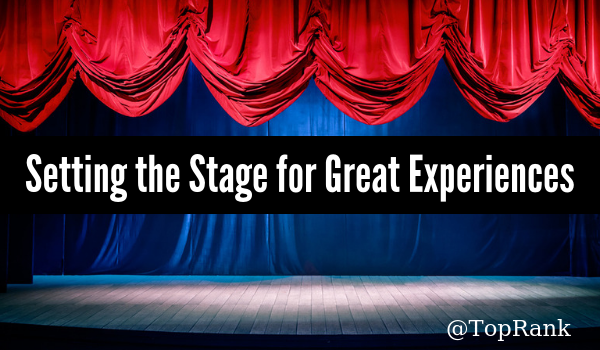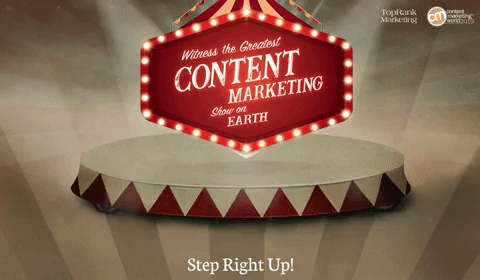
We’re coming up on the 10-year anniversary of the movie Avatar, which was released in December of 2009 and held the title of highest-grossing film worldwide for nearly a decade before being unseated by Avengers: Endgame earlier this year.
James Cameron’s signature cinematic spectacle presents a model worth following for any content marketer hoping to amaze their audience. We don’t need a $200 million budget, as Avatar had, but we should aspire to adopt the meticulous planning and strategic foresight that drove the film’s galactic success.
This was the leading subject in our new interactive CMWorld experience, Witness the Greatest Content Marketing Show on Earth, produced in collaboration with Content Marketing Institute to create ahead of next month’s festivities in Cleveland. The show-stopper theme of the conference, and this experience, is designed to place content creators in the mindset of an entertainer, where dazzling viewers is the foremost goal.
Let’s explore some of the essentials of audience-first planning, with a little help from Mr. Cameron and our esteemed cast of CMWorld speakers.
Elements of Planning a Showstopping Content Experience
#1 – Start with a Concrete Strategic Framework
It’s never too early to lay the groundwork for a content initiative. Cameron began writing Avatar in 1994, some 15 years before the movie actually came out. Virtually every great piece of entertainment is the result of thoughtful, collaborative, insight-driven planning. Success is no accident.
From a content marketing perspective, this means first documenting your strategy, and letting it serve as the backbone of your entire process. Here you will want to account for three key buyer stages: Discovery, Consumption, Action. (And if you’re thinking beyond the first sale, Retention and Advocacy.) Getting a customer-centric strategy nailed down embeds a consistent beacon for your entire team to follow, and ensures no one loses sight of whom you’re serving. It also minimizes confusion and wayward tactics.
As Amanda Todorovich, whose team at Cleveland Clinic has effectively made content a (monetizable) central attraction, puts it: “Your strategy shouldn’t be constantly changing. It should be a solid foundation that’s documented and communicated across the entire team. The investment of time needs to be made up front in establishing a solid framework and core strategy.”
Your strategy shouldn’t be constantly changing. It should be a solid foundation that’s documented and communicated across the entire team. — @amandatodo Share on X#2 – Stay Nimble and Adaptive
Needless to say, if the vision for Avatar didn’t change in the 15 years between Cameron’s original script treatment and the movie’s ultimate release, the final product would’ve been… quite outdated. So while adhering to a stable core strategy is important, we also need to build flexibility into our planning, in accordance with evolving audiences and markets.
Just as movie-goers have dynamic tastes and preferences, so too do the customers and prospects we are marketing to. Vet your assumptions against data-driven research and interactions with audience members (e.g. surveys, polls, conversations). Stay in tune with trends around growing buying committees and lengthening purchase cycles. Don’t be afraid to make small bets in the name of failing-and-learning, because this is the only way to meaningfully innovate.
We test, experiment, optimize and iterate our work every single day, but the core strategy stays constant because it’s still working/successful and aligns to our organization’s mission. — @amandatodo Share on X#3 – Align with Technology Advancements and Audience Behaviors
The integration of cutting-edge 3D visuals helped elevate Avatar beyond any cinematic experience before it, and that’s a major reason for the film’s gobsmacking success. But another reason is the ambitious marketing efforts that coincided with the film’s release, including partnerships with other big brands to create experiences outside of theaters.
We need to think about how our content is going to be discovered by a modern audience, and how we can optimize around these areas. One clear opportunity in today’s evolving content marketing landscape is voice search.
Addressing this emerging discovery method can feel intimidating at first, but it’s helpful to understand that optimizing for voice doesn’t require a drastic deviation from smart modern SEO practices. Google handles voice queries, like most others, through a question-and-answer convention, so the key to winning voice search lies in creating authoritative best-answer content.
Children’s Health’s Courtney Cox Wakefield, who will speak on the subject at CMWorld, echoes our thoughts on this nuance: “There’s a huge opportunity for voice search in content marketing and it begins with optimizing your content to rank in the answer box, which is then read by voice-first devices like Amazon Alexa and Google Home as their voice answers … You can get answer box rankings by implementing natural language headers, mimicking the structure of the content you see ranking for the queries you want to rank for.”
There’s a huge opportunity for voice search in content marketing and it begins with optimizing your content to rank in the answer box, which is then read by voice-first devices like Amazon Alexa and Google Home as their voice answers. —… Share on X#4 – Emphasize Emotional Pull
In order to stand out and truly engage your audience, the content must connect at a deeper level. In Avatar, Cameron sought to establish this resonance through an alien sci-fi tale that was intrinsically relatable to human viewers.
In content marketing, there are numerous techniques for developing emotional hooks. But from our view, the most crucial — and the one that makes every other connective link possible — is trust.
Trust is the linchpin of customer engagement, relationships, retention, and advocacy. Trust is so integral to successful branding and marketing today that we recently introduced our own reconfiguration of the traditional marketing funnel: the trust funnel, which shifts our strategic orientation toward this critical ideal more directly.
Margaret Magnarelli of Morgan Stanley agrees with this focus: “Trust is your ticket to admission, and therefore needs to be treated as a main event. Social science research shows that there are four main components of trust in human interaction: capability, benevolence, honesty and authenticity.”
Social science research shows that there are four main components of trust in human interaction: capability, benevolence, honesty and authenticity. — @mmagnarelli Share on XBuilding trust through these four tenets should be a guiding objective from the very start of your planning. We can accomplish it through tactics like influencer credibility, being the best answer, and impactful storytelling (Cameron’s specialty).
Set the Stage for Your Next Exemplary Content Experience
Each of the steps above was instrumental in helping Cameron put together one of the most spectacular (and spectacularly lucrative) experiences in movie history. But just like any creator, his work was also shaped by the influence of peers and pioneers in his field. Among them is an icon of sci-fi cinema.
“Directors that continue to inspire me? Ridley Scott. I mean, I’ll go to see any Ridley Scott movie. Even the ones that bomb, to me, are great. Because of the fabric of the filmmaking. You know, just the way he sees, the way he places the camera, so on.
As strategic content marketers, we’re fortunate to be able to draw inspiration from a wide range of forward thinkers, many of whom will be on stage for Content Marketing World 2019, set to get underway on Sept. 3, 2019.
You can find plenty more insights from these experts, like the ones above, by visiting our interactive experience, Witness the Greatest Content Marketing Show on Earth. It’s a worthy first step in planning a content marketing blockbuster that wows your crowd.





